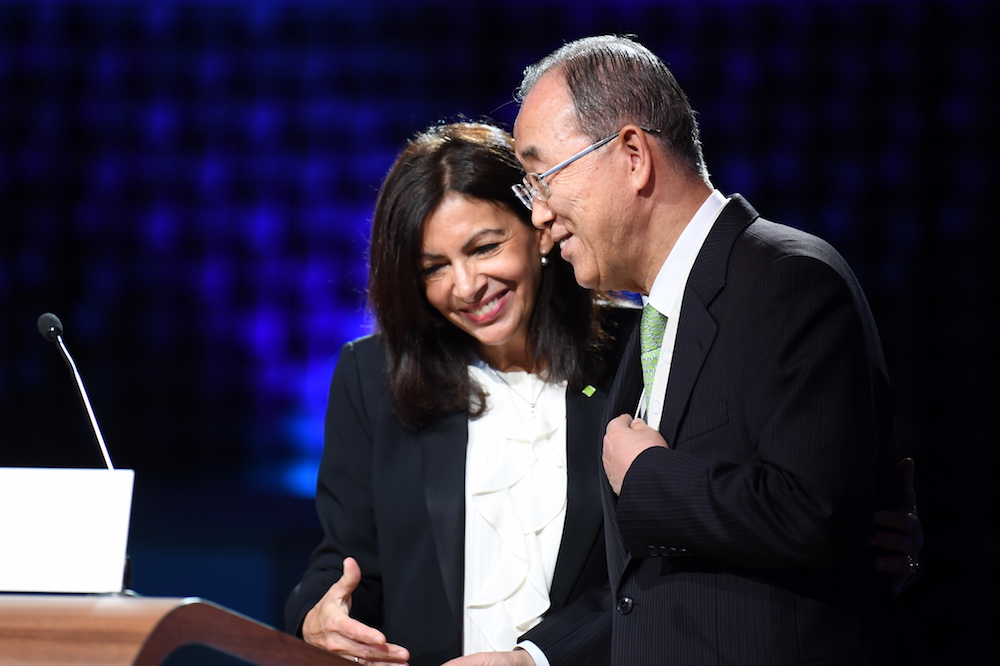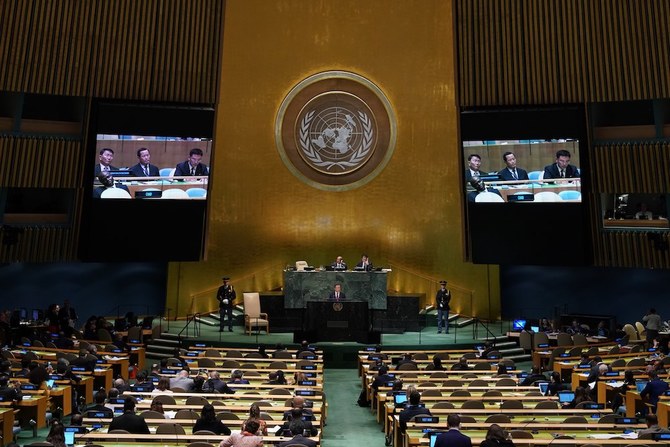NEW YORK CITY: From the day it was founded, the role and responsibilities of the United Nations’ secretary-general have been somewhat ambiguous. In the aftermath of the Second World War, the ambivalence of the victorious Allied powers towards the post, once dubbed “the most impossible job on this earth,” was evident from the very first meeting 75 years ago.
When the discussion turned to the appointment of the first secretary-general, the Allies — Britain, France, China, the US and the Soviet Union — took a firm stand against a secretary-general directly elected by the General Assembly and defended the veto power they later came to possess over the appointment process as Permanent Members of the Security Council.
It also became evident from the outset that the choice of a secretary-general would not be based on any qualifications, stature and leadership qualities, but would be determined simply by what the US and the Soviet Union could agree on.

Empty grounds at the United Nations September 22, 2020 during the the 75th General Assembly of the United Nations which was mostly virtual due to the COVID-19 pandemic in New York. (AFP/File Photo)
So although Article 97 of the UN Charter grants the responsibility of selecting a UN chief to the General Assembly, “acting on the recommendation of the Security Council,” the assembly’s role for the first 70 years was limited to rubber-stamping the decision of the five Permanent Members of the council (known as the P5) who “recommended” just one candidate for the assembly to appoint.
Candidates were forced to engage in backroom deals to secure the P5’s support in exchange for promising high-level UN posts for their nationals. For instance, in 1996, France vetoed Kofi Annan until he agreed to name a French national to head UN peacekeeping operations.
The opaque selection process has resulted in a credibility crisis that has dogged the global body for decades.

However, five years ago, this began to change.
On Oct. 13, 2016, the General Assembly appointed a secretary-general who, for the first time since the UN’s inception, was not the first choice of the US and Russia: Antonio Guterres.
Guterres’s selection crowned years of intense lobbying by civil society groups and some members of the General Assembly for a more open and inclusive selection process. The campaign, conducted in New York and other major capitals, culminated in the adoption by the General Assembly of the landmark Resolution 69/321 in September 2015, which calls for a broad timeline for the selection process and puts forth criteria for a candidate who embodies the highest standards of competence and integrity.

Incumbent secretary-general Antonio Guterres was appointed to the position by the General Assemby on On Oct. 13, 2016. (AFP/File Photo)
The General Assembly agreed to publish the names of all candidates, along with their CVs and mission statements, and invited states to put forward female contenders. Later, Resolution 70/305 opposed a monopoly on senior UN posts by any state or group of states.
“It doesn’t sound groundbreaking, but it really was — to actually have the names of the candidates in the public domain,” said Ben Donaldson, co-founder of 1 for 7 Billion: Find the Best UN Leader, a civil society group that launched a campaign to reform the process in 2014 and has since been joined by 750 NGOs and their affiliates worldwide.
“To us and many others in civil society, it seemed outrageous that there were no qualifications necessary, no application process, no shortlisting, nothing in the public domain about how the successful candidate is found.
“It seemed crazy that, for a position that is at the forefront of responding to global challenges like climate change and humanitarian catastrophes, there was so little scrutiny and transparency.”
On Dec. 15, 2015, a year before the end of Ban Ki-moon’s term as secretary-general, the president of the Security Council, US Ambassador Samantha Power, and the president of the General Assembly, Mogens Lykketoft, sent a joint letter launching the selection process.

Former secretary-general Ban Ki-Moon attending a conference during the One Planet Summit on December 12, 2017 in Paris. (AFP/File Photo)
Lykketoft, the proactive president of the 70th General Assembly who has made a priority of “creating more transparency and openness when selecting the next secretary-general,” set up a website that listed the candidates and their vision statements.
Parleys were held and streamed online and member states were permitted to grill the 13 candidates — 7 women and 6 men — about their record and vision for the future. Questions were fielded from all over the world as thousands of citizens took part in the meetings.
“So that was the revolution really: as soon as there were candidates, visions and CVs in the public domain, suddenly that unlocked a whole swathe of openness, as well as expansive debates in the GA hall about the future of the UN: What sort of organization should we be? And how can we transform to a healthier, more open organization in order to deal with catastrophes facing humanity?” Donaldson told Arab News.
Two groups in the General Assembly became the strongest advocates for an open and inclusive process and soon joined efforts with 1 for 7 Billion — the Accountability, Coherence, and Transparency (ACT) group of 25 states, of which Jordan and Saudi Arabia are members, and the 120 states that form the Non-Aligned Movement (NAM), coordinated by Algeria.

United Nations Secretary-General Antonio Guterres pays his respect after laying a wreath on the grave of Dag Hammarskjold, who served as UN Secretary-General from 1953 until his death in Uppsala, Sweden, on April 22, 2018. (AFP/File Photo)
For years they had been calling for a stronger General Assembly role in the selection, and for more transparency and inclusivity.
“But reforms only went so far,” Donaldson said. “Because after the period of inclusivity and transparency during the 2016 race, the process returned to the Security Council where the decision as to who was to become the next secretary-general happened behind closed doors where the Permanent Members hold a veto. The Security Council then recommended a single candidate for the General Assembly to appoint.
“So, the reforms stayed true to the UN Charter but, crucially, the will of the General Assembly was able to mitigate the will of the P5 and that represents a huge success. At 1 for 7, we are delighted that we were able to chip away at some of the power and privilege that P5 has been able to cling on to for years.”

United Nations Secretary-General Antonio Guterres (L) meets with Swedish Crown Princess Victoria at the Dag Hammarskjold Foundation in Uppsala, Sweden, on April 22, 2018. (AFP/File Photo)
With Guterres’ first term ending just a year from now, Donaldson has urged the president of the 75th General Assembly to work with his counterpart in the Security Council to kickstart the selection process by outlining a well-structured plan for the appointment of the next secretary-general.
Due to the COVID-19 pandemic, General Assembly meetings intended to refine the selection process — particularly important this time around, as it could involve an incumbent standing for a second term — did not take place.
“Due to this upheaval, we could find ourselves inadvertently missing an opportunity to consolidate the fantastic reforms which took place in 2015-16,” Donaldson said. “By extension, the UN could be missing out on the chance to bolster its legitimacy by running a transparent, inclusive process to appoint its next leader.”
-------------------
Twitter: @EphremKossaify




























